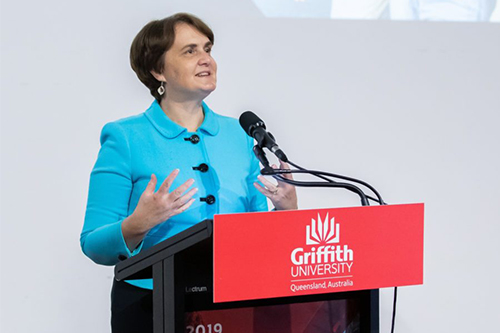
Griffith University has announced an ambitious $1bn plan to develop infrastructure across its campuses.
The “substantial” new development – which sets out the University’s vision as it approaches its 50-year anniversary in 2025 – includes a new location in Brisbane’s CBD, greater access for students and enhanced connectivity between industry, government and other stakeholders.
The strategy is the culmination of nine months of extensive ongoing consultation with staff and key stakeholders including industry partners, government, community, students and alumni.
The University’s Vice Chancellor and President, Professor Carolyn Evans, said the ‘Creating a Future for All: Strategic Plan 2020-2025’ is aimed at giving Griffith “a more visible and confident presence” in the Brisbane CBD.
“It will be a university that all Queenslanders can be proud of,” Professor Evans said.
“Additional programs in business, law, public policy and journalism along with Continuing Professional Development will add a new dimension to the University’s presence in Brisbane leveraging off the proximity to commerce and industry,” Professor Evans said.
Substantial investment will be also made into the existing Nathan, Gold Coast and Logan campuses over a 10-year period, ensuring “a strong and sustainable future for the University as a major educational institution serving the people of South East Queensland”.
‘Extensive opportunities’ for students
The University’s bold new plan will also see the creation of the Griffith Graduates of the Future program which will ensure every undergraduate student has a capstone experience that is work-related.
This can include an internship, international mobility experience, research project, or participation in a national or international competition.
Students will also have extensive opportunities to learn outside their core disciplines in areas such as: data science; business skills; innovation and entrepreneurship; behaviour science/ psychology; communications and journalism; Asian culture and languages; environment and sustainability; Indigenous cultures and knowledge; justice, ethics and human rights.
“A traditional learning experience is not enough, moving forward,” Professor Evans said.
“We plan for all our students to embrace opportunities that set them on their career path equipped with a 21st-century skill set. This strategy will ensure Griffith students are more prepared for the workplace of the future with the confidence and ability to adapt to whatever challenges arise.”
The University has also committed to a major research program establishing ‘Griffith Beacons’ – large scale, collaborative research undertakings bringing together disciplines from across the University to address critical questions and tackle complex societal problems.
“The strategy builds on Griffith’s ability to build interdisciplinary research teams from across the University which can play a significant role in tackling real world problems,” Professor Evans said.
“Our objective is to ensure that the future brings benefits to as many people as possible, providing positive outcomes – social, economic, health and cultural – for the people of Queensland, Australia and the world.”


